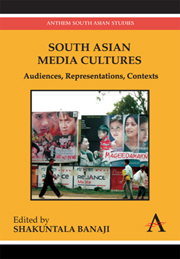Book contents
- Frontmatter
- Contents
- List of Illustrations
- 1 Introduction
- Part One Elaborating Audiences: Meaning, Use and Social Context
- Part Two Telling Texts: Media Discourse, Identity and Politics
- 6 Private Satellite Media and the Geo-Politics of Moderation in Pakistan
- 7 Forgetting to Remember: The Privatisation of the Public, the Economisation of Hindutva, and the Medialisation of Genocide
- 8 Myth – The National Form: Mission Istanbul and Muslim Representation in Hindi Popular Cinema
- 9 A Peace of Soap: Representations of Peace and Conflict in Popular Teledramas in Sri Lanka
- 10 Destigmatising Star Texts – Honour and Shame among Muslim Women in Pakistani Cinema
- Part Three Alternative Producers: The Articulation of (New) Media, Politics and Civic Participation
- List of Contributors
7 - Forgetting to Remember: The Privatisation of the Public, the Economisation of Hindutva, and the Medialisation of Genocide
from Part Two - Telling Texts: Media Discourse, Identity and Politics
Published online by Cambridge University Press: 05 March 2012
- Frontmatter
- Contents
- List of Illustrations
- 1 Introduction
- Part One Elaborating Audiences: Meaning, Use and Social Context
- Part Two Telling Texts: Media Discourse, Identity and Politics
- 6 Private Satellite Media and the Geo-Politics of Moderation in Pakistan
- 7 Forgetting to Remember: The Privatisation of the Public, the Economisation of Hindutva, and the Medialisation of Genocide
- 8 Myth – The National Form: Mission Istanbul and Muslim Representation in Hindi Popular Cinema
- 9 A Peace of Soap: Representations of Peace and Conflict in Popular Teledramas in Sri Lanka
- 10 Destigmatising Star Texts – Honour and Shame among Muslim Women in Pakistani Cinema
- Part Three Alternative Producers: The Articulation of (New) Media, Politics and Civic Participation
- List of Contributors
Summary
On 8 December 2007, anchorwoman Barkha Dutt from the English-language section of the private Indian national news broadcaster NDTV (New Delhi Television, that was until 2003 Star News, part of Rupert Murdoch's transnational News Corporation) had a very interesting article published in the Hindustan Times. Dated two weeks before Narendra Modi's second electoral triumph as Chief Minister of the state of Gujarat was made public, it was – in the last phase of the election campaign – concerned with the media's positioning vi-à-vis the infamous yet highly popular regional leader of the Hindu nationalist BJP (Bharatiya Janata Party). The controversy around Modi arises from his personal and administrative support for the systematic killing of well over 2000 Muslims between March and May 2002, the investigation of which has been largely thwarted but which is basically beyond doubt. Publicisation of the controversy is closely linked to the national, and particularly the English-language media, that often took a scandalised and highly critical stance towards Modi at the time; and again when the Gujarat electorate confirmed Modi in office in December 2002. In her article written five years later, Dutt analyses the personality cult that grew in intervening years around the Chief Minister in Gujarat. She considers it reminiscent of a ‘monsters' ball’, that has pushed aside the dominance of traditional party hierarchies in the state.
- Type
- Chapter
- Information
- South Asian Media CulturesAudiences, Representations, Contexts, pp. 123 - 144Publisher: Anthem PressPrint publication year: 2010
- 1
- Cited by

